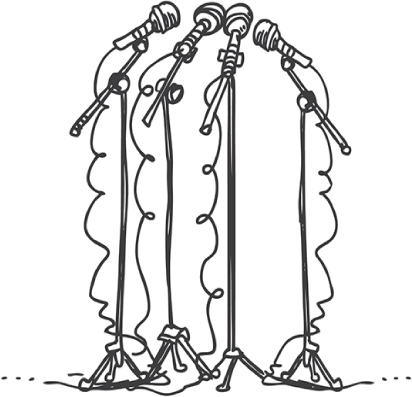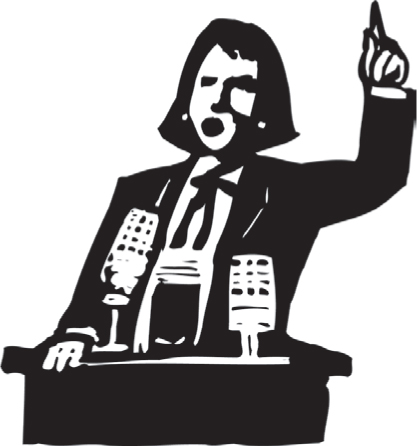![]()
MEANING: someone who gives a twisted and favorable version of events; a political press agent or publicist
IN CONTEXT: A good spin doctor could have made the scandal a lot less damaging.

Spin doctor has its origins in fairly recent American politics. The word “spin” has been in use since the early 1800s in relation to telling a story. James Hardy Vaux’s 1819 book A New and Comprehensive Vocabulary of the Flash Language referred to “spinning a yarn, signifying to relate their various adventures, exploits, and escapes to each other.” But it wasn’t until the 1980s that the full expression began. Ronald Reagan described the public relations officers to his Strategic Defense Initiative as being on “spin control” in providing a favorable version of events to the media. The phrase soon changed to spin doctor in the colloquial sense of someone who could repair something.
![]()
MEANING: hard work and effort in difficult conditions
IN CONTEXT: It took a lot of blood, sweat, and tears to plough the muddy field by hand.
Blood, sweat, and tears is said to have originated from John Donne’s 1611 poem “An Anatomy of the World.” It was later written by the Welsh minister Christmas Evans in his 1837 Sermons on Various Subjects when he referred to Christ being “bathed in his own blood, sweat, and tears.” But it was Winston Churchill, the British Prime Minister and great orator, who brought the phrase to the people in a speech to the House of Commons in 1940. When speaking of the hardships that were sure to come during World War II, he said, “I have nothing to offer but blood, toil, tears, and sweat.”
![]()
MEANING: the decisive point
IN CONTEXT: When it comes to the crunch, Sally will always tell the truth.
When it comes to the crunch began with British politics in the mid-1900s and is another expression credited to Winston Churchill. In the time leading up to and during World War II, Churchill began using the word “crunch” to describe decisive or challenging situations. A 1939 edition of The Daily Telegraph quoted him as saying, “Whether Spain will be allowed to find its way back to sanity and health depends upon the general adjustment or outcome of the European crunch.” Churchill’s usage of crunch in this sense soon spawned the full expression that exists today.
![]()
MEANING: to show ingratitude
IN CONTEXT: I was given a scholarship to the college so I decided not to bite the hand that fed me and refrained from criticizing its policies, even though I disagreed with them.
Generally used in the negative with “don’t,” the expression bite the hand that feeds you is thought to date back to the Greek poet Sappho in 600 BC, when she used the metaphor of a dog biting its master. But the phrase is attributed to Edmund Burke, the Irish statesman and political theorist. Referring to public anger at the government for a food shortage, he wrote in his 1795 memorandum Thoughts and Details on Scarcity, “Having looked to government for bread, on the first scarcity they will turn and bite the hand that feeds them.”
![]()
MEANING: everything will be all right and a favorable result will be achieved with very little effort
IN CONTEXT: Just fill out the application form, put it in the post, and Bob’s your uncle, you’ll get your money.
Generally said to conclude a set of simple instructions, Bob’s your uncle dates back to 1886. In that year, Arthur Balfour was unexpectedly appointed to the prestigious job of Chief Secretary for Ireland. Many believed he was not qualified for the job and didn’t deserve it. As it turned out, the then British Prime Minister, Robert Gascoyne-Cecile, was Balfour’s uncle. It was the Prime Minister’s nepotism that got Balfour the post, and as a result he went on to enjoy a successful career in politics, even becoming Prime Minister himself, all because Bob was his uncle. As a side note, the word “nepotism” actually derives from “nephew,” completing the link.
![]()
MEANING: a trip that makes stops in many places over a short space of time
IN CONTEXT: We traveled around the entire country in ten weeks—a real whistle stop tour.
Whistle stop tour stems from politics. During the mid-1900s in America, trains stopped at all the major towns, but they only stopped at small towns if a passenger requested it. Upon such a request, the conductor would blow the train’s whistle twice to indicate a stop was approaching. During President Harry Truman’s 1948 campaign, he traveled by train, stopping briefly at many places to deliver speeches. During his speech in Los Angeles, Truman joked and said that it was the biggest whistle stop town he had visited. The crowd loved it and the phrase stuck.
![]()
MEANING: a successful outcome is absolutely certain
IN CONTEXT: With only ten minutes to go, the lead was twenty-five points so the game was in the bag.
While there are conflicting theories on the origins of in the bag, including those relating to baseball and hunting, the early days of the British parliament is its likely birthplace. On the back of the Speaker’s chair hung a velvet bag. All successful petitions that were brought before the House of Commons would be placed in that bag. Because it was known that all such petitions had been successful, they became known as in the bag.
![]()
MEANING: a strong signal of agreement or endorsement
IN CONTEXT: After a rousing speech in the British parliament, the members loudly shouted “hear, hear.”

Hear, hear originated in the British parliament in the late 17th century. In both the House of Commons and the House of Lords, if anyone disagreed with a speaker they would hum loudly to try to drown out the speech. But if any members were in agreement with what was being said, they would shout “hear him, hear him” in an attempt to make those humming men actually listen. It was later contracted to “hear, hear,” and is still used in parliament today to signify the listener’s agreement with the point being made. It is also thought to be said because applause is generally forbidden in parliament.
Nothing Is Certain Except for Death and Taxes
![]()
MEANING: only these two things in life are certain
IN CONTEXT: Don’t write off victory just yet. Nothing is certain except for death and taxes.
Nothing is certain except for death and taxes had been written in various forms during the 1700s. In his 1726 book The Political History of the Devil, Daniel Defoe wrote: “Things as certain as death and taxes, can be more firmly believed.” However, it was Benjamin Franklin, one of the Founding Fathers of America, who coined the phrase and made it widespread. In discussing the new constitution in a letter to Jean-Baptiste Leroy in 1789, Franklin wrote: “Our new Constitution is now established, and has an appearance that promises permanency; but in this world nothing can be said to be certain, except death and taxes.”
![]()
MEANING: abide by the rules; submit to authority
IN CONTEXT: Steve had disobeyed his parents all month, so he decided it was time to toe the line and do as he was told.
Toe the line has political origins. In the British House of Commons, arguments often became heated. To deter members of opposing parties from attacking each other, two parallel red lines were marked on the floor. The lines were two sword lengths apart, and the members were required to stand behind their respective lines at all times. If any member did cross the line and approach the other party, he was ordered to retreat and toe the line. The lines still exist in the parliament today and the tradition remains, although nobody carries swords.
![]()
MEANING: to speak or carry out a task spontaneously, without preparation
IN CONTEXT: His speech was thirty minutes long and was entirely off the cuff.
Off the cuff is a phrase that relates to public speaking. In the 1800s, men wore shirts with detachable collars and cuffs, which made them easier to clean. Politicians and keynote speakers generally wanted to give an audience the impression that they were good speakers who could hold the people’s attention without any preparation or the need to refer to notes. It was a common practice at the time to write notes on their shirt cuffs before a speech. Only they could see the notes, so the audience would be none the wiser. Politicians would also make additional last-minute notes on their cuffs to counter the arguments of their opponents.
![]()
MEANING: a fantasy; an unachievable dream
IN CONTEXT: He always talks about setting up his own business but the plans are just pie in the sky.

Pie in the sky has American origins and was coined by Joe Hill in 1911. Hill was an instrumental member of the radical labor organization The Industrial Workers of the World, known as the Wobblies. He wrote a number of songs for the Wobblies, including “The Preacher and the Slave,” which parodied the Salvation Army hymn “In the Sweet By-and-By.” Hill’s song criticized the Salvation Army’s philosophy, in particular their desire to save souls rather than feed the hungry. The lines of Hill’s parody were, “You will eat by and by, in that glorious land in the sky. Work and pray, live on hay. You’ll get pie in the sky when you die.”
![]()
MEANING: to join in an already-successful venture
IN CONTEXT: Once it became apparent that Craig would win the election, everyone decided to jump on the bandwagon and support him.
To jump or climb on the bandwagon has its origins in politics. In 19th-century America, traveling bands and circuses would parade through towns on brightly colored, well-decorated bandwagons. They would often perform at political rallies and attracted large crowds of people. Because the bandwagons were usually the center of attention at any given event, wily politicians saw an opening. The politicians would often climb up on the bandwagon, interrupt the performance, and campaign to the captive audience below.